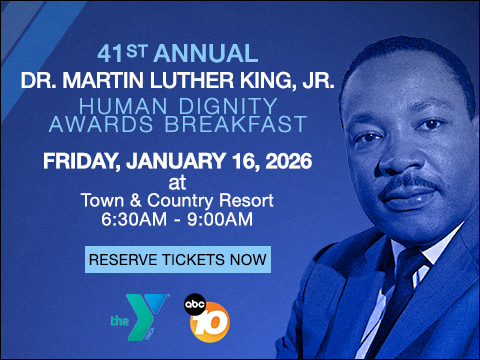SAN DIEGO (KGTV) — The CDC says the US is making progress on booster shots, but one in three eligible, vaccinated adults remains unboosted.
In San Diego, the number is even worse: just 53 percent of eligible residents are considered "up to date" on their booster. To find out why, 10News and the San Diego Union-Tribune commissioned a scientific poll.
San Diego County has a better-than-average vaccination rate at 80.8 percent, but nearly one million of those residents remain unboosted. "There’s a substantial risk of not having a booster, both for hospitalization and for death," said Dr. Eric Topol, director of the Scripps Research Translational Institute.
Data from the CDC shows that six months after the initial vaccination, two doses alone are just 57 percent effective against hospitalization from omicron. That’s protection from hospitalization, not symptoms.
A study in the UK found two doses of Pfizer were just 10 percent effective against COVID-19 symptoms after six months.
The booster raises protection against hospitalization back up to 90 percent, according to both studies.
Those differences are reflected in death rates. In December, vaccinated-but-unboosted individuals died from COVID at a rate seven times higher than those who had been boosted. The rate was 0.71 deaths per 100,000 individuals compared to 0.1 deaths per 100,000. Unvaccinated Americans died at a much higher rate: 9.74 deaths per 100,000 individuals.
ABC 10News and the San Diego Union-Tribune conducted a scientific poll of 500 San Diego County residents.
In the sample, 78 percent were fully vaccinated, which is in line with the county’s rate of 80 percent.
Those with boosters were asked why they decided to get the shot. 44 percent said they got a booster to protect their own health, while 28 percent said it was to protect the health of others. Meanwhile, 8 percent said they received the booster because it was a requirement for work or school.
Then we asked people who were vaccinated but not planning to get a booster why they felt that way.
Of the 29 people in that category, nearly one-third said they believed they had already done their part, 24 percent said they believe the booster doesn’t help that much, 14 percent said the booster doesn’t completely prevent COVID, and 11 percent said they believed the initial vaccine provides enough protection.
Because of the small sample size that responded to this question, there was a wide confidence interval of ±20 percent.
The poll offers a glimpse into the profile of the vaccinated-but-unboosted. More than 70 percent were under the age of 50, 44 percent identified as Republicans and 35 percent identified as Independents. Just 13 percent were Democrats.
We also asked people if the CDC should change the definition of fully vaccinated to include a booster shot like some other countries. 36 percent said the definition should be updated, while 49 percent opposed changing the definition.
California's mask requirements
Starting next week, California will lift mask requirements on vaccinated people in most indoor public places, like shops, gyms, bars and movie theaters. The changes take effect Feb. 16. Face coverings will be required for unvaccinated people only in those environments.
58 percent of respondents said they agreed with the decision to lift mask requirements next week, including 77 percent of Republicans, 58 percent of Independents, and 47 percent of Democrats.
36 percent of the poll respondents disagreed.
At K-12 schools, mask requirements will remain in place for teachers and children. 46 percent of respondents said they'd prefer to maintain mask requirements at schools regardless of COVID-19 case totals. 63 percent of Democrats supported that position, along with 40 percent of Independents and 21 percent of Republicans.
24 percent of the respondents said masks should only be required when cases reach a certain threshold.
Another 24 percent said schools should not require masks at all. That view was held by 47 percent of Republicans and 7 percent of Democrats.





